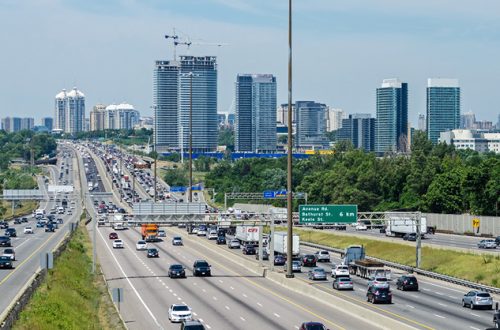Yesterday, the Ontario government, in consultation with the Chief Medical Officer of Health and other health experts, took action to limit mobility and reduce transmission of COVID-19. Specifically, the province is declaring a second provincial emergency under s 7.01 (1) of the Emergency Management and Civil Protection Act (EMCPA).
The Government of Ontario declared its first provincial emergency in response to COVID-19 on March 17, 2020 which remained in effect until July 24, 2020.
This second State of Emergency comes into effect January 14 and is expected to remain in place for at least 28 days (until February 9). The stay-at-home order is effective Thursday, January 14 at 12:01 a.m. To implement these additional public health measures, amendments will be made to regulations under the Reopening Ontario (A Flexible Response to COVID-19) Act, 2020, as well as regulations issued under the Emergency Management and Civil Protection Act (EMCPA).
Public Health Restrictions
- Outdoor organized public gatherings and social gatherings are further restricted to a limit of five people with limited exceptions.
- Individuals are required to wear a mask in indoor areas of businesses that are open. It is now recommended that masks be worn outdoors when physical distancing is difficult to maintain.
- All non-essential retail stores, including hardware stores, alcohol retailers, and those offering curbside pick up or delivery, must open no earlier than 7 a.m. and close no later than 8 p.m.
- Stores that primarily sell food, pharmacies, gas stations, convenience stores, and restaurants for takeout or delivery can maintain their normal hours of operation.
- Any business that can have its employees work from home should shift to that model.
- Non-essential construction is further restricted (details below).
In addition, Ontario is exploring options to put a temporary residential eviction moratorium in place. More details will be made available soon. Short-term rentals, including those pre-booked, are no longer permitted unless to provide housing.
Below is the list of essential workplaces that impact engineers and engineering graduates in Ontario, that are allowed to remain open:
- Construction projects and services associated with the health care sector and long-term care, including new facilities, expansions, renovations and conversion of spaces that could be repurposed for health care space.
- Construction projects and services required to ensure safe and reliable operations of, or to provide new capacity in, provincial infrastructure, including transit, transportation, energy, mining and justice sectors beyond the day-to-day maintenance.
- Construction projects and services that support the operations of, and provide new capacity in schools, colleges, universities, municipal infrastructure and child care centres within the meaning of the Child Care and Early Years Act, 2014.
- Construction projects under the Investing in Canada Infrastructure Program.
- Construction projects and services that support the operations of Broadband internet and cellular technologies and services.
- Critical industrial construction activities required for,
- the maintenance and operations of petrochemical plants and refineries,
- significant industrial petrochemical projects where preliminary work has already commenced,
- industrial construction and modifications to existing industrial structures limited solely to work necessary for the production, maintenance, and/or enhancement of Personal Protective Equipment, medical devices (such as ventilators), and other identified products directly related to combatting the COVID-19 pandemic.
- Construction projects that are due to be completed before July 2021 and that would provide additional capacity in the production, processing, manufacturing or distribution of food, beverages or agricultural products.
- Construction projects that were commenced before Jan. 12, 2021, and that would,
- provide additional capacity for businesses that provide logistical support, distribution services, warehousing, storage or shipping and delivery services, or
- provide additional capacity in the operation and delivery of information technology services or telecommunications services.
- Residential construction projects where,
- a footing permit has been granted for single family, semi-detached and townhomes
- the project is a condominium, mixed use or other residential building, or
- the project involves renovations to residential properties and construction work was started before Jan. 12, 2021.
- Construction to prepare a site for an institutional, commercial, industrial or residential development, including any necessary excavation, grading, roads or utilities infrastructure.
- Construction and maintenance activities necessary to temporarily close construction sites that have paused or are not active and to ensure ongoing public safety.
- Below-grade multi-unit residential construction projects, such as apartments and condominiums.
- Construction on any project intended to provide either,
- affordable housing, or
- shelter or supports for vulnerable persons,
- If the project is being funded in whole or in part by, or is being undertaken by, any of the following:
- the Crown in right of Canada or in right of Ontario,
- an agency of the Crown in right of Canada or in right of Ontario,
- a municipality,
- a service manager as defined in the Housing Services Act, 2011, or
- a registered charity and not for profit within the meaning of the Income Tax Act (Canada).
- Information Technology (IT) services, including online services, software products and the facilities necessary for their operation and delivery
- Telecommunications providers and services (phone, internet, radio, cell phones etc.) and facilities necessary for their operation and delivery
- Retail stores operated by a telecommunications provider or service may only permit members of the public to enter the premises
- Maintenance, repair and property management services that manage and maintain the safety, security, sanitation and operation of institutional, commercial, industrial and residential properties and buildings.
- Transportation services provided by air, water, road, and rail, including taxis and other private transportation providers, and
- Support services for transportation services, including:
- logistical support, distribution services, warehousing and storage, truck stops and tow operators, and
- services that support the operations and safety of transportation systems including maintenance and repairs
- Marinas, boating clubs and other organizations that maintain docking facilities for members or patrons with conditions
- Businesses that provide and support online retail, including by providing warehousing, storage and distribution of goods that are ordered online.
- Businesses that provide and ensure the domestic and global continuity of supply of resources, including, resource exploration, mining, forestry, aggregates, petroleum, petroleum by-products and chemicals.
- Electricity generation, transmission, distribution and storage and natural gas distribution, transmission and storage.
- Businesses that extract, manufacture, process and distribute goods, products, equipment and materials, including businesses that manufacture inputs to other manufacturers (e.g. primary metal/ steel, blow molding, component manufacturers, chemicals, etc. that feed the end-product manufacturer), regardless of whether those other manufacturers are inside or outside of Ontario, together with businesses that support and facilitate the movement of goods within integrated North American and global supply chains.
- The EMCPA will provide all enforcement and provincial offences officers (Ontario Provincial Police, local police forces, bylaw officers and provincial workplace inspectors) with the authority to issue tickets to individuals who do not comply with the stay-at-home-order, or those not wearing a mask. This is in addition to tickets that can be issued to retail operators or companies who do not enforce mask use.
- Enforcement personnel will have the authority to temporarily close a premise and disperse individuals who are gathering, regardless of whether a premise is closed or remains open (park or house).
- Schools in the following public health units will not return to in-person instruction until at least February 10, 2021:
- Windsor-Essex
- Peel Region
- Toronto
- York
- Hamilton
- The Chief Medical Officer of Health will advise the Ministry of Education which public health units will be permitted to resume in-person instruction by January 20, 2021, based on data and modelling.
- Schools in northern public health units will continue to remain open.
Evidence gathered from COVID-19 related workplace inspections to date shows the vast majority of employers and workers are following COVID-19 safety requirements when working. However, when in a break room, a vehicle or not on the clock, there is a tendency to forget about the importance of wearing masks, maintaining physical distance and hand hygiene.
As part of the "Stay Safe All Day" campaign, inspectors will use a data-driven approach to focus on workplaces with reported COVID-19 outbreaks, manufacturing businesses, warehouses, distribution centres, food processing operations, construction projects and publicly accessible workplaces deemed essential, such as grocery stores. The Ministry is also using a new data-sharing program, in conjunction with the Ministry of Long-Term Care and the Retirement Regulatory Authority, to focus onsite inspections of long-term-care homes and retirement homes.
In the unfortunate event that an employee becomes infected with COVID-19, they may be entitled to federally funded paid sick leave of up to $500 a week for two weeks. Workers can also access Canada's Recovery Caregiver Benefit of up to $500 per week for up to 26 weeks if they are unable to work because they must care for their child under 12 years old or a family member who needs supervised care.
Additional Resources
- Ontario Continues to Support Employers and Workers during COVID-19
- Enhancing Public Health and Workplace Safety Measures in the Provincewide Shutdown
- Visit Ontario’s COVID-19 vaccine web page to view the latest provincial data and information on COVID-19 vaccines.
- Visit Ontario’s website to learn more about how the province continues to protect the people of Ontario from COVID-19.
- If you have questions about what will be open or impacts to your business or employment, call the Stop the Spread Business Information Line at 1-888-444-3659.
- Get tested if you have symptoms compatible with COVID-19, or if you have been advised of exposure by your local public health unit or through the COVID Alert App. Visit Ontario.ca/covidtest to find the nearest testing location.
- To find the right supports, visit COVID-19: Support for People, which has information about the many available and free mental health services and supports.
- To stay safe, you can download the COVID Alert App free from the Apple and Google Play app stores.
- COVID-19: Reopening Schools
- COVID-19 school and child care screening
- Operational Guidance: COVID-19 Management in Schools
OSPE applauds these measures, as well as the availability of these resources for Ontarians.
Additional detailed information regarding the stay-at-home order can be found here.
From the beginning of this pandemic OSPE mobilized to create a COVID-19 Economic Recovery Working Group comprised of engineers, as well as an Infrastructure Working Group alongside the Ministries of Infrastructure, Labour and Skills Development, and Municipal Affairs and Housing. Through this working group, OSPE, with other industry and labour partners worked to establish new health and safety protocols to protect workers on infrastructure projects, as well as work through the contractual obligations resulting from project delays and disruptions.
OSPE members have been providing input and recommendations throughout the pandemic to ensure the concerns of engineers are top of mind to government officials and policy makers.
To read OSPE’s recommendations to both the Ontario and Canadian governments please visit our additional blog posts:
- OSPE’s Long-Term COVID-19 Economic Recovery Recommendations
- Federal Government acknowledges and supports OSPE’s COVID-19 Economic Recovery Recommendations
- OSPE’s recommendations regarding the impacts of COVID-19 on Infrastructure
OSPE will continue to work with our partners, including all orders of government, to monitor the situation as it evolves and to ensure the safety and security of the engineering community.
If you have any questions regarding this recent government announcement, or any of OSPE’s COVID-19 advocacy work, please let us know at advocacy@https://ospe.on.ca/wp-content/uploads/2024/10/academy-banner-7.png.on.ca





Leave a Comment